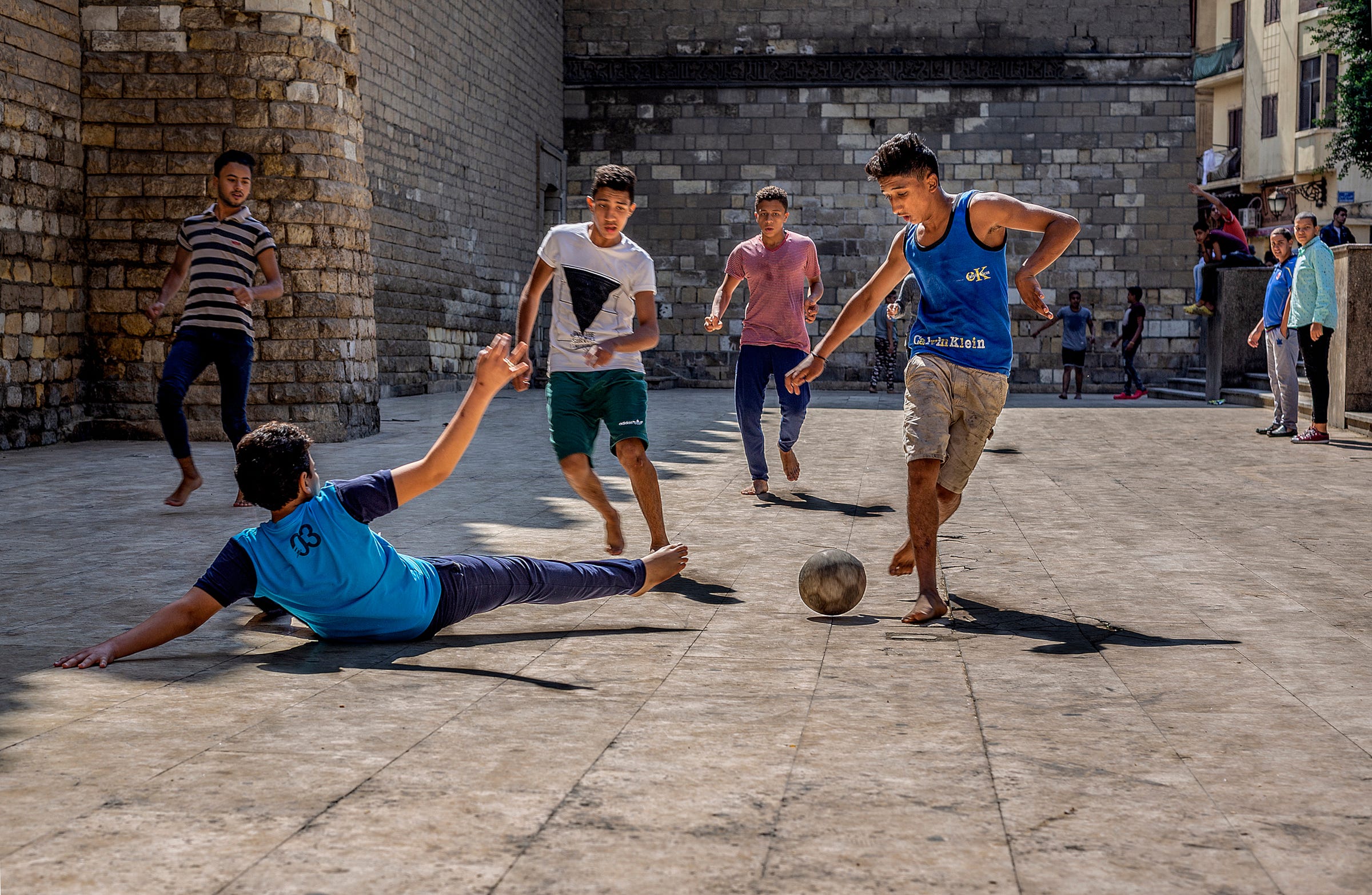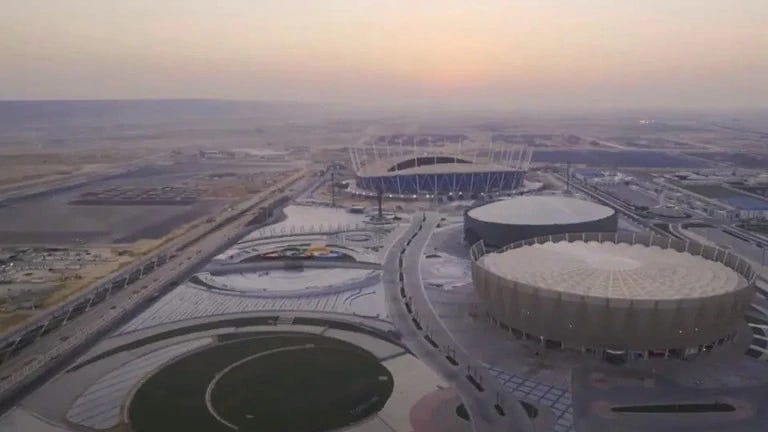Football in the time of hunger
Amid a mounting debt crisis and austerity measures, Egypt turns its attention to Mo Salah and the national team for a glimmer of hope in the expanding darkness.

Welcome to Sports Politika, a newsletter and media platform focused on the intersection of sports, power and politics. This newsletter was founded by investigative journalist and researcher Karim Zidan and relies on the support of readers.
If you have not done so already, please consider becoming a paid subscriber.
On one of the last days of the Egyptian national team’s training camp ahead of the African Cup of Nations tournament in the Ivory Coast, a selection of Egyptian Olympic champions arrived to meet with the team’s star player, Mohamed Salah.
Among those who attended and took selfies with Salah were Egyptian weightlifting champion and Olympic bronze medalist Sara Samir, Greco-Roman Olympic bronze medalist Mohamed Ibrahim Kisho, and Ahmed El Gendy, who won a silver medal at the 2020 Summer Games in modern pentathlon.
Footage showed Salah applauding the Olympic champions, saying that he is “honoured” by their presence and that they represent the best the country has to offer.
The gathering took place on the grounds of a brand new football stadium at the imaginatively-named New Administrative Capital on the outskirts of Cairo. With an estimated budget of $58 billion, the city is the most expensive project undertaken by the current regime.
The New Administrative Capital—which spans over 270 miles, roughly the size of the Kingdom of Bahrain in the Persian Gulf—will also include an “Olympic City” sporting complex, complete with state-of-the-art training facilities, a three-tier Olympic Stadium, and a football stadium that is the biggest in the Middle East and the second biggest in Africa, with a reported capacity of nearly 94,000 spectators. The complex has been touted by regime officials as a one of the seminal attractions at the new urban centre, built with an eye towards the country's possible bids for the Olympic Games or the FIFA World Cup.
However, as Egypt’s military regime continues with its mega projects, the country economy is on life support.
Over the past few years, Egypt has endured the most severe economic crisis since the 2011 revolution. The current debt crisis, spurned government spending on mega projects, has resulted in soaring inflation, capital flight, and a weak currency that continues to fall against the dollar. This constellation of economic disasters has rendered the cost of living unaffordable for the average Egyptian.
The regime’s determination to fund elaborate mega projects also led to a borrowing spree that quadrupled Egypt’s foreign debt over the past eight years. The country’s external debt now stands at $165.3 billion, according to Central Bank of Egypt data in November 2023.
Egyptians under the poverty line and struggling to find cheap food amid soaring prices. More than 70% of Egypt 105 million population relies on the government’s bread subsidy programme, making it the largest food subsidy program in the Middle East and North Africa. Yet even that has been impacted by rising cost following Russia’s invasion of Ukraine, which disrupted global wheat supplies.
Meanwhile, pro-regime TV shows and state-media channels have spent the last year promoting alternatives to the usual dietary preferences. Some called on Egyptians to eat chicken instead of beef. However, when the price of chicken began to soar, they advised people to eat beans. Finally, the National Institute for. Nutrition called on Egyptians to switch to chicken feet as a source of protein, fuelling outrage and ridicule among Egyptians online.
With little else to offer hope and joy, Egyptians will now turn to football in the hopes of witnessing Salah win his first AFCON title.
Egypt happens to have a long and storied history with AFCON, which is the most prestigious football tournament in Africa. The Arab world’s most populous country has won the event a record seven times, including the inaugural event in 1957, as well as three consecutive wins in 2006, 2008, and 2010.
However, the country has not managed to reclaim its former glory since the 2011 Arab Spring, which was the same year that Salah first appeared on the national team. Since then, Egypt has reached the finals on two occasions (2017 and 2021). In the last edition of AFCON, Salah’s team came close to winning the cup but fell short in a penalty shootout against Sadio Mané’s Senegal.
Despite the loss, it had been Egypt’s best performance in years. In 2018, Egypt crashed out of the World Cup without winning a single match. The following year, Egypt hosted AFCON but failed to reach the quarter-final stage in a tournament plagued with scandals including accusations of sexual harassment against Salah’s teammate Amr Warda.

Salah, 31, will once again have the opportunity to end Egypt’s title drought.
"I want to win this competition,” Salah told reporters ahead of the tournament. “I would love to win it."
Meanwhile, the Egyptian regime hopes that a solid performance at AFCON may distract people from their growing hunger.
Last week, Egyptian officials kicked off the new year with a series of price hikes. Electricity prices swelled by around 15% on average; public transportation prices rose by 20%, while internet services increased by 33%. Key commodities such as sugar have nearly doubled in price while inflation hit an all-time high of over 35% last year.
Egyptians are also bracing for another rumoured currency devaluation in the coming weeks, which will likely reduce standards of living further and add to the growing resentment towards Abdel Fattah el-Sisi, Egypt’s president who took power following a military coup in 2013. Despite running on a populist message of short-term sacrifices for long-term prosperity, Egyptians have only grown poorer and hungrier during his tenure in office.
Despite his dwindling popularity, el-Sisi saw fit to demand his fellow countrymen to go hungry in service to their country.
“If progress, prosperity, and development come at the price of hunger and deprivation,” he said in October, “Egyptians, do not shy away from progress! Don’t dare say: ‘It is better to eat.’”
“By God”, Sisi continued, “if the price of progress and prosperity is that we don’t eat or drink as others do, then we will not eat or drink.”
Sports Politika is a media platform focusing on intersection of sports, power and politics. Support independent journalism by upgrading to a paid subscription ( or gift a subscription if you already have your own). We would appreciate if you could also like the post and let us know what you think in the comment section below.




"Finally, the National Institute for. Nutrition called on Egyptians to switch to chicken feet as a source of protein..."
I forgot about this!